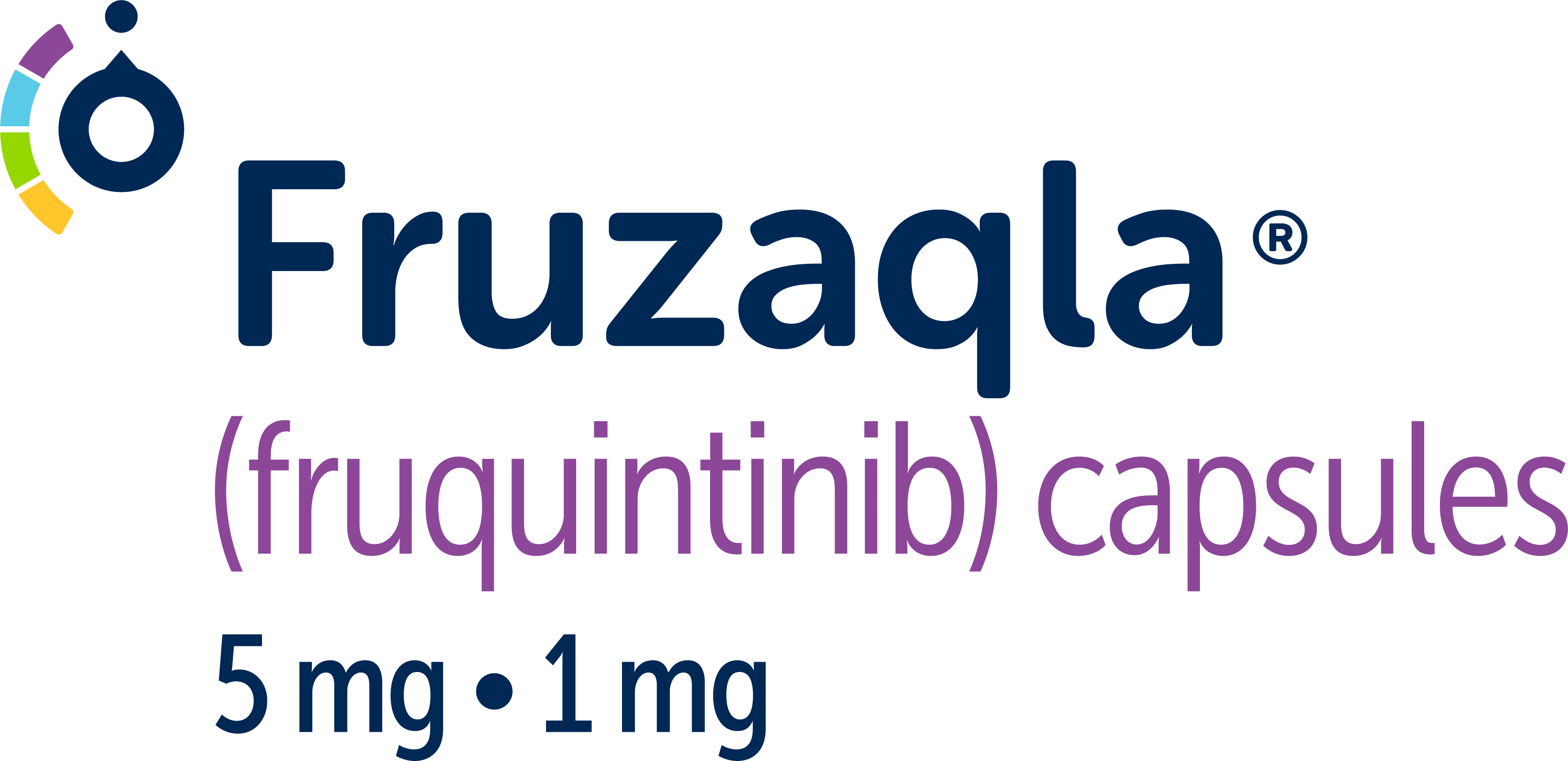
What is FRUZAQLA® (fruquintinib)?
FRUZAQLA is a non-chemotherapy kinase inhibitor
Treatments are needed in metastatic colorectal cancer (mCRC) to improve outcomes. FRUZAQLA may be able to help. FRUZAQLA is a kinase inhibitor of vascular endothelial growth factor receptors (VEGFRs) for adult patients with previously treated mCRC, regardless of mutation status.1-4
• Approved in 2023 based on the FRESCO and FRESCO-2 clinical trials4
• Convenient, once-daily oral dosing4
• An innovation in mCRC treatment4
Treatments that extend survival are needed in metastatic colorectal cancer (mCRC)1-3
Colorectal cancer (CRC) can be deadly, with low survival rates for patients with metastatic disease3
The incidence of mCRC in patients younger than 50 years of age, while relatively low, is increasing at a worrying pace5,6
Despite a majority of patients with mCRC being ≥65 years of age between 2010 and 2019, the greatest increase in mCRC was seen in younger patients6
Selecting the right treatment at the right time is imperative for maximizing the benefit of therapy7-9
Progression in mCRC often leads to fewer patients reaching a third or fourth treatment or beyond, either due to disease progression or a transition to BSC
In real-world settings...
National Comprehensive Cancer Network® (NCCN®) recommends Fruquintinib (FRUZAQLA®) as a potential treatment option for patients with previously treated mCRC, regardless of mutation status10,11
Fruquintinib (FRUZAQLA®) is indicated for the treatment of adult patients with metastatic colorectal cancer (mCRC) who have been previously treated with fluoropyrimidine-, oxaliplatin-, and irinotecan- based chemotherapy, an antiVEGF therapy, and, if RAS wild-type and medically appropriate, an anti-EGFR therapy.4
Potential treatment algorithms*†‡
†These examples are for BRAF and HER2 wild type, pMMR/MSS, and NTRK gene fusion negative disease, unless otherwise noted.10,11
‡Please see NCCN Guideline for Colon or Rectal Cancer for full recommendations.
§If RAS mutant.
¶If RAS wild type.
FOLFIRI=leucovorin, fluorouracil, and irinotecan; FOLFIRINOX=leucovorin, fluorouracil, oxaliplatin, and irinotecan; FOLFOX=leucovorin, fluorouracil, and oxaliplatin; HER2=human epidermal growth factor receptor 2; MSS=microsatellite stable; pMMR=proficient mismatch repair.
Adapted with permission from the NCCN Clinical Practice Guidelines in Oncology (NCCN Guidelines®) for Colon Cancer V.5.2025. © 2025 National Comprehensive Cancer Network, Inc. All rights reserved. The NCCN Guidelines® and illustrations herein may not be reproduced in any form for any purpose without the express written permission of NCCN. To view the most recent and complete version of the NCCN Guidelines, go online to NCCN.org. The NCCN Guidelines are a work in progress that may be refined as often as new significant data becomes available.
Adapted with permission from the NCCN Clinical Practice Guidelines in Oncology (NCCN Guidelines®) for Rectal Cancer V.4.2025. © 2025 National Comprehensive Cancer Network, Inc. All rights reserved. The NCCN Guidelines® and illustrations herein may not be reproduced in any form for any purpose without the express written permission of NCCN. To view the most recent and complete version of the NCCN Guidelines, go online to NCCN.org. The NCCN Guidelines are a work in progress that may be refined as often as new significant data becomes available.
NCCN makes no warranties of any kind whatsoever regarding their content, use or application and disclaims any responsibility for their application or use in any way.
FRESCO-2 Efficacy Results
Learn about the efficacy results from FRESCO-2, a global, double-blind, placebo-controlled study with a heterogenous patient population.
FRESCO-2 Safety Profile
Explore the safety profile of FRUZAQLA from the FRESCO-2 clinical trial.
